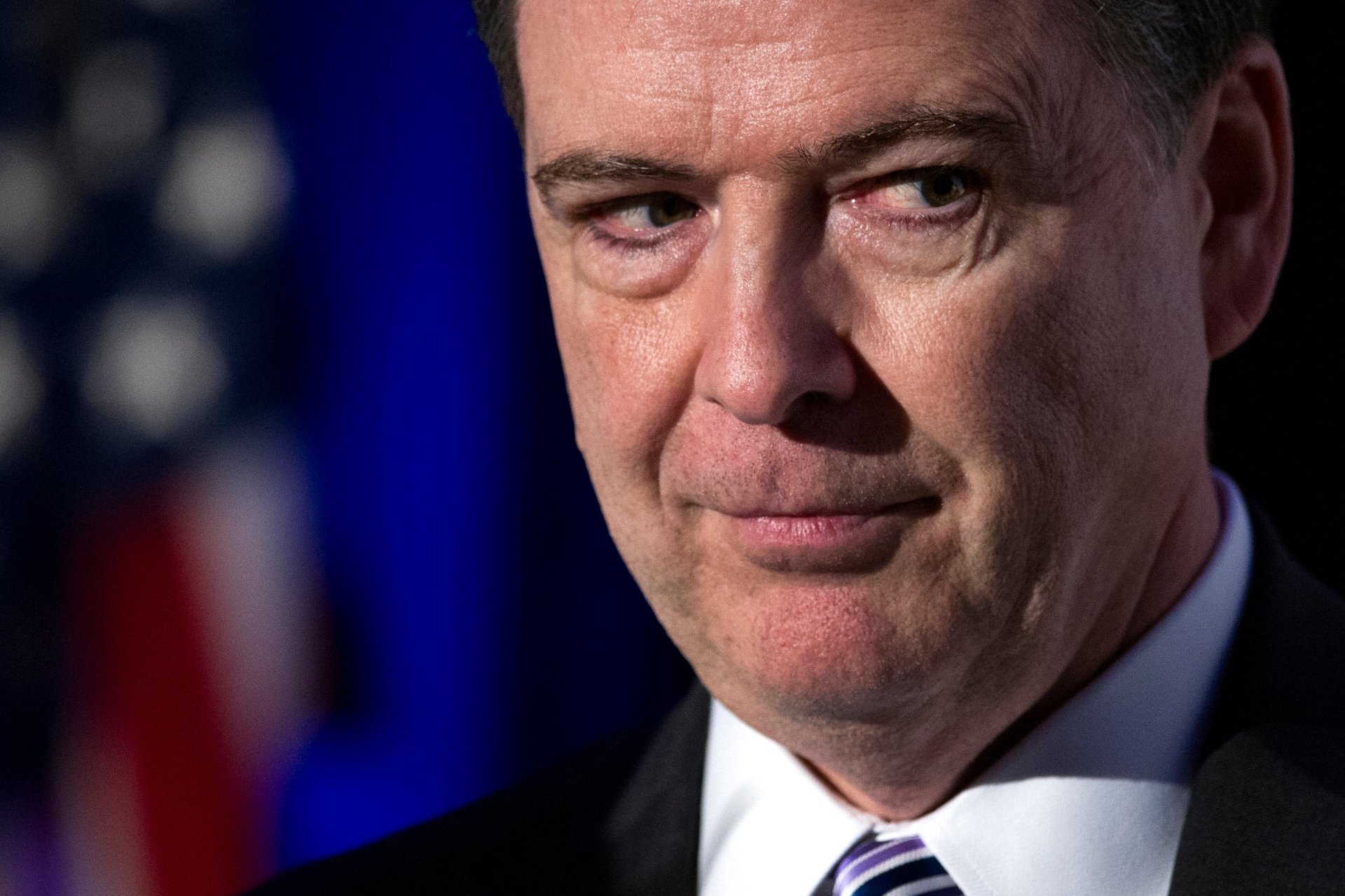How serious is the firing of FBI director James Comey? Three likely scenarios, ranked
With an unanticipated coup de théâtre, Donald Trump fired FBI director James Comey yesterday (May 9). Comey learned of his dismissal from cable news reports while at an event on talent acquisition and diversity at the FBI. It was so unexpected that the former FBI director apparently thought it was a joke.


With an unanticipated coup de théâtre, Donald Trump fired FBI director James Comey yesterday (May 9). Comey learned of his dismissal from cable news reports while at an event on talent acquisition and diversity at the FBI. It was so unexpected that the former FBI director apparently thought it was a joke.
According to the official version of what transpired, the Trump administration decided to fire Comey in large part because of his handling of the investigation into Hillary Clinton’s emails. But the fact that Comey was in charge of investigating potential ties between the Trump administration and Russia seems too coincidental to overlook. Many pundits have also pointed out the parallels between Trump’s decision and president Richard Nixon’s notorious Saturday Night Massacre, when Nixon fired the special prosecutor investigating the Watergate scandal.
Trump’s administration has already weathered its fair share of scandals. The maelstrom of media coverage and the confusing and contradictory explanations offered by Trump aides can make it difficult to discern which stories are actually problematic and which are more smoke than fire.
So how big a deal is Comey’s firing? To gauge this we first need to know the real reasons motivating Trump and his attorney general. With the administration sticking to its story—for now—here is a ranking of possible scenarios:
Trump fired Comey because his mistakes made the FBI look bad
Ranking: Easy D
On May 8, Comey testified in front of the Senate judiciary committee. During this appearance, he said that HillaryClinton’s top aide Huma Habedin had forwarded “hundreds and thousands” of emails to her husband Anthony Weiner, some of which were classified—so that Weiner could print them out. That claim turned out to be incorrect. According to the White House, it was also the last straw: Comey had mishandled the Clinton investigation since the very beginning, the administration used this last mistake as a reason to finally pull the plug on him.
If plain incompetence is indeed the real reason behind Comey’s firing, it would represent the least concerning scenario. As Quartz has already pointed out, the decision could have been managed more elegantly and the timing is bizarre as most of Comey’s alleged mistakes happened months ago. Then again, delayed firings are one of Trump’s specialities.
The silver lining? If Trump is truly committed to investigating Russia’s alleged meddling—and this is a huge hypothetical if—he may be more likely to appoint an independent special prosecutor to pick up Comey’s investigation.
Trump fired Comey because he wouldn’t investigate wiretapping at Trump Tower
Ranking: Sad!
Trump is a master conspiracy theorist, especially when it comes to the circumstances of his own election. Whether claiming Clinton benefited from millions of illegal votes or arguing with the National Parks Service over the crowd at his inauguration, Trump, by his own admission, believes the truth is not absolute.
One of Trump’s strongly held opinions is the unproven claim that president Obama tapped his phones during the campaign. Relatedly, it’s possible that when Comey refused to substantiate the conspiracy, the president grew increasingly frustrated and eventually decided to cook up an excuse to get rid of the FBI director. Comey’s bungled testimony regarding the Clinton emails represented the perfect opportunity.
A vindictive president who believes in alternative facts and doesn’t like being questioned is an unpredictable president. Partisanship is bad enough—presidents should not allow their personal biases to dictate policy and professional duties.
Trump fired Comey because of the Russia investigation
Ranking: Total disaster!
But what if Trump was truly attempting to use his executive powers to halt an investigation and potentially enable a cover-up? This is the worst case scenario.
Comey was reportedly expanding the investigation into Russia’s alleged involvement in the 2016 presidential election. In this last and most troubling scenario, Trump, eager to hinder the FBI’s search—or simply wishing to avoid a prolonged PR disaster—instructed his staff to find an excuse, no matter how old, to cut the head off the proverbial snake.
Attorney general Jeff Sessions, who had publicly recused himself from the Russia investigation, was involved in the decision of removing Comey and will be involved in choosing the next FBI director. If impeding the FBI’s investigation really was the objective, Trump will now be able to select a prosecutor friendly to the White House. Whoever is selected will also have their predecessor’s fate as a reminder of what happens to directors who dare challenge the president. In such a scenario, it is also unlikely the attorney general (who helped him get rid of Comey) would appoint a special prosecutor.